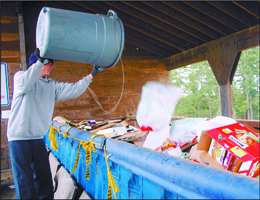Public Works Director Frank Mulcahy predicts county residents should see changes in the solid waste system around the end of August.
The changes follow the Nov. 8 election when voters rejected a proposal for a parcel fee to help fund the financially troubled county solid waste utility. The rejection was construed as a vote for “Plan B” — which ends the county’s operation of solid waste facilities and moves to roadside pickups for almost all residential trash and recycling.
Since the vote, Public Works, a council subcommittee, and Administrator Pete Rose have worked to flesh out Plan B and create a time table.
“It’s not quite as easy as just throwing a switch,” Mulcahy said. “We want to make sure we have a smooth transition to the new system, which means we have to coordinate with a lot of agencies and entities.”
Major stakeholders in the transition include the Port of Lopez, which may take over the Lopez facility, the operator of the Exchange at the Orcas facility, and the Town of Friday Harbor — owner of the county-operated facility on San Juan.
Before the transition is complete, the County Council must adopt an updated Solid and Hazardous Waste Plan that accommodates handling changes. The plan, which covers disposal of medical wastes, large appliances, car batteries, motor oil, solvents, surplus pesticides, paint and other potentially dangerous waste, must pass through the Washington Department of Ecology. The county must also decide specifics of recycling and required services of the certified waste hauler.
San Juan Sanitation said it needs time to purchase equipment, and recruit and train employees once the council formally adopts a “level of service” ordinance. The county is also discussing how to provide service to remote areas.
When the smoke finally clears, the county’s role in the solid waste system will be reduced, but it will have responsibility and costs for monitoring decommissioned landfills, and providing services not offered by the waste hauler.
“Under state law, San Juan County remains responsible for insuring that the trash, recycling and hazardous wastes generated in this county are taken care of properly,” Mulcahy said.
Read more about the rejected parcel fee at http://www.sanjuanjournal.com/news/134044483.html.



